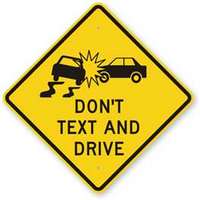Despite knowledge of state laws, less than one fifth of drivers willing to stop using mobile devices while driving
 |
BOSTON--September 23, 2013: Studies like this are very eye opening because they show us just how many distractions motorists are faced with when they get behind the wheel”
Plymouth Rock Assurance, a leading automobile insurance carrier serving Massachusetts and Connecticut, today released findings from the company’s Connecticut Distracted Driving Study. The study was conducted to measure the awareness of and response to the state’s distracted driving laws, which prohibit the use of hand-held cell phones and mobile electronic devices while operating a motor vehicle. While the majority (89 percent) knew that texting while driving is prohibited, less than 20 percent of people who admitted to texting while driving were willing to stop.
Nearly a third of study participants, representing licensed drivers of all ages from across Connecticut, admitted to reading and/or sending text messages while driving. Drivers ages 17-44 texted while driving nearly four times as much as older drivers. The study revealed that the motivation to text while driving appeared to be largely for personal reasons, as opposed to work-related messaging.
The U.S. Department of Transportation (DoT) defines distracted driving at Distraction.gov as “any activity that could divert a person's attention away from the primary task of driving.” According to the DoT, 3,331 people were killed nationwide in crashes involving a distracted driver in 2011, up from 3,267 in 2010. Specifically, text messaging creates a crash risk 23 times worse than driving while not distracted, according to the Virginia Tech Transportation Institute.
“Studies like this are very eye opening because they show us just how many distractions motorists are faced with when they get behind the wheel,” said Chris Olie, CEO of Plymouth Rock Assurance. “Even with laws in place to protect drivers, passengers and pedestrians, all motorists need to make safe driving decisions. There are more devices in the market than ever before, and drivers need to understand that texting is not the only form of distracted driving. As an insurance provider, we try our best to promote safe driving behaviors, and we hope studies like this will encourage all motorists to take steps to make the roads safer.”
Grassroots efforts to change distracted driving behavior could prove difficult in Connecticut, as most passengers (70 percent) are reluctant to ask drivers to put their mobile devices down while their cars are in motion. However, the single noticeable factor that serves as a deterrent for texting while driving is having a child in the car. Nearly 80 percent of study participants noted that they would not text while there were passengers 13 years of age or younger in the car.
Other notable findings include:
Behaviors not typically considered as a distraction were the most common among drivers: 93 percent talked with other passengers, 92 percent tuned the radio, 81 percent eat or drink and 79 percent reach for items on the front seat. On a weekly basis, distracted drivers were active with mobile technologies: 36 percent programmed a navigation system, 35 percent made/received calls without using hands-free technology and 48 percent read/sent text messages. Texting occurs most frequently (71 percent) while drivers are idling at a traffic sign or signal. Males are most likely (26 percent) to text in a moving car than the other groups in the study.
Similar studies by Plymouth Rock and its affiliates found that 40 percent of Massachusetts drivers and 22 percent of New Hampshire drivers admitted to texting while driving. The complete findings of these studies will be shared with all participants and are available for download on Plymouth Rock’s website. More than 500 Connecticut drivers participated in this study, which was conducted online in August 2013 by survey provider Cvent.
In an effort to fight back against distracted driving, Plymouth Rock Assurance will attempt to set a new world record for the Most Pledges to a Safety Campaign. Drivers interested in signing the pledge and helping to set a new world record can do so by visiting Fight Distracted Driving .


